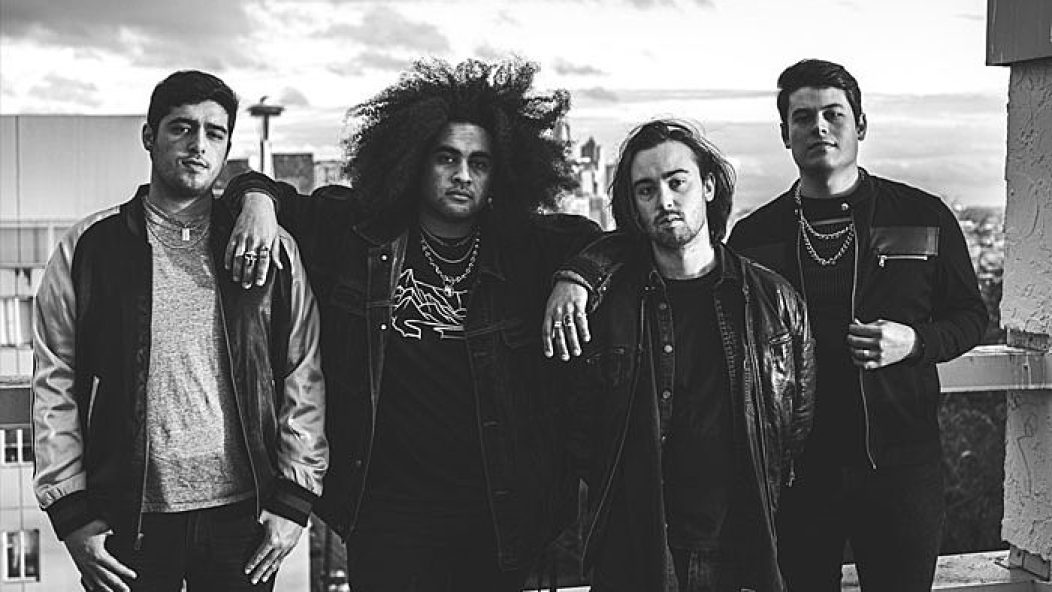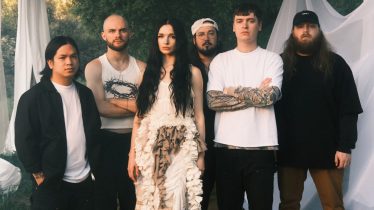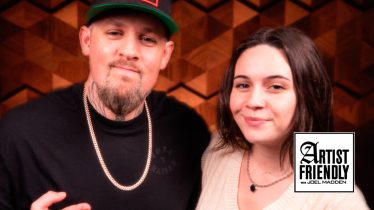
King Youngblood are navigating protests and the pandemic in "Opaque"
If there’s an award for most topical music video of the year, we should probably close the voting now. “Opaque,” by Seattle’s King Youngblood, folds today’s two major storylines—the pandemic and protests—into one striking five-minute clip. The video conflates the isolation of the pandemic and the marginalization that’s spurred protests for racial equality. But the story of the video, and the song, goes even deeper than that, frontman Cameron Lavi-Jones says.
“We wanted to talk about what the story of ‘Opaque’ is. What the story of marginalized voices are,” he says, via Zoom, from Seattle. “But also accommodate two things. One is not telling marginalized people how to respond. I think that’s a big issue that we see…gaslighting Black and Brown voices. Telling them they should respond like Malcolm. Or respond like Martin. Instead of being able to have their outlets in different ways.”
Read more: These groundbreaking Black artists moved the underground forward
Even though social distancing complicated the shoot, the video serves as an important reminder, Lavi-Jones adds. “The fight against systemic racism and systemic oppression is still happening while we are in the middle of a pandemic,” he says.
Lavi-Jones is just 21, but he’s no newcomer to the music industry or to activism. His father, Maurice Jones Jr. is a musician, producer and former Black Panther. Meanwhile, his mother, Lara Lavi, has had many entertainment roles: as an artist, a TV and film writer and an attorney.
Black, Jewish and proud of both, their son has made a national name for himself this spring. He and King Youngblood have helped organize inside Seattle’s Capitol Hill Occupied Protest (CHOP). Producer Adam Kasper (Nirvana, Pearl Jam, Foo Fighters) is helping the group finish their new album, God I Am Exhausted. But they’re also trying to keep their eyes on the bigger prize.
Read more: These 16 Afro-Punk artists made huge contributions to alt-rock
“This is our modern civil rights movement,” Lavi-Jones says. “This is what’s happening now.”
I’ll paraphrase one of your quotes (about CHOP): We have to wake people up to remind them that we’re protesting. It seems like the bigger challenge is not anarchy but apathy. As a musician, what do you do?
With CHOP, it made a lot of sense so long as people remember you have to center the movement. Center the ideas that improve the lives of the marginalized. You can’t be pulling up in there doing a party. Throwing something for yourself, to center yourself. You have to do what’s going to make the generation after you stronger.
I think people are missing the mark on both ends. On the Fox News end, it’s this terrible anarchy. But then also, within that community…people are becoming complacent, who don’t understand the gravity of the situation.
What my function is, as an artist and an activist, is…that we’re trying to fight an ideology. That we’re supposed to be second-class citizens. Combating those concepts that threaten my life and the life of Black and Brown people every single day.
Read more: 10 new songs from Black artists who should already be on your playlist
Artists who are activists are open to particular criticism. “You’re speaking out about X, Y or Z, but you’re also promoting your career.” How do you respond to that?
You can’t convince other people that something that is fake is real. Especially considering the CHOP situation. There are a lot of calls about that exact thing…co-opting the movement. Where I think King Youngblood have really been making sure to pay attention [is] to not centering ourselves. Skepticism is important. Because it shows that we’re holding people accountable for the way they use their voices. That’s vital, always.
I would say I invite people to have a conversation. I’m always trying to be an advocate for sharing stories and sharing voices. The key to figuring [if] somebody’s real is if they’re sharing that space with other people who need to speak, too.
Why the name switch from Gypsy Temple to King Youngblood?
The concept was Gypsy Temple was reclaiming this slur used to hurt me and other people in my community. Reclamation of terms is always something that I agree with—especially as a Black Romani Jew. [Laughs.]
Read more: Seattle alt-rock princes Gypsy Temple share debut full-length
I am the only Romani person in the band. The band are my passion project, my baby, the thing that I’m riding and dying for. [But] other people who are part of it don’t have that same identity. Now that isn’t a bad thing for us, but it means we have to think a lot more critically. Because our function is to push for the voices of anyone who is marginalized.
Implied in the view for “Opaque” is that this is the kind of social isolation that some people feel every day.
We wanted to show [that] Black and Brown people [will] come to terms with the reality around them in different ways. Some of them are going to make it internal and tear up photos and memories of themselves. And hopefully reconstruct them again in a better way. Others are going to suffer through the cycle of isolation. And hopefully find some way to reach out and find help for their mental health. Other people are going to have to get that aggression out. By being safe—but, you know, by destroying a cello. Or something that is their voice and their message. Other people are going to feel like they’re constantly running away from the things that are trying to kill them. And all of those things are valid.
Read more: Halsey is supporting Black creators’ art through a new fund
Your mom was very involved in the making of this video. Your dad is a musician, a producer and a radio host. What’s the best piece of advice you’ve gotten from one, or both, of them?
Oh, man. Geez. You’re asking me to condense a book into two sentences. [Laughs.] So much wisdom. I’m trying to consolidate it into one ultra-Voltron quote.
I think my mom has always supported being true with my voice…and making art that I’m proud of. Which is manifested in making art that talks about my experience. That is built upon pushing for a better world.
From my dad, I think the best advice I ever got from him was…get where you need to go but be flexible about how you get there. Because it’s more important that you get to that destination…holding on to your integrity and your authenticity.
Your producer Adam Kasper has said you’re further along than Dave Grohl at this point in your respective careers.
That’s a huge honor. But I would be remiss if I didn’t stress the humility coming from my end.
Read more: You could be watching even more music videos in Spotify soon
I interned at the Museum Of Pop Culture, formerly known as the EMP [Experience Music Project], here in Seattle. And from doing that…I ended up meeting Dave and speaking to him. Meeting him really gave me the sense that he’s very aware of supporting up-and-coming artists.
So I wouldn’t be so far along if it wasn’t for people like Dave supporting the up-and-comers. I wouldn’t have it if I wasn’t a Black artist. If I didn’t have that fundamental experience and understanding going into my art, as well. When I catch a compliment like that, I try to let people know, “We’re all on the same team here.”
Watch “Opaque” below.








